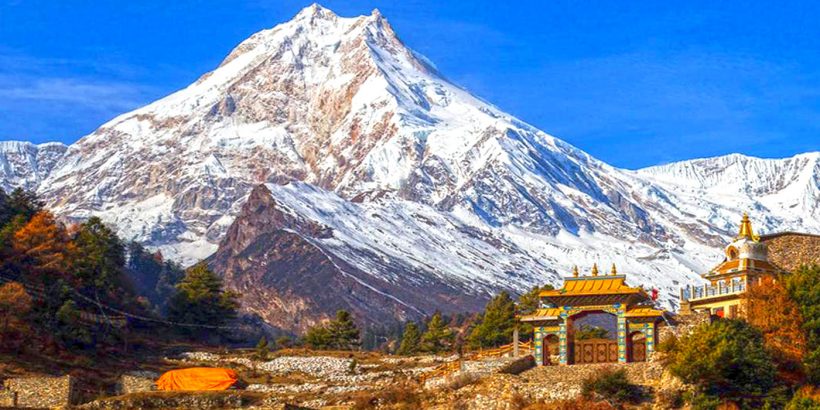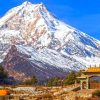Price:$1,299.00
Limi Valley Trek
Description
The Limi Valley trek takes you to the off-beaten trails which offer an interesting background of ancient Tibetan Gumbas and culture along with beautiful mountains and pristine nature. Situated in the far western corner of Nepal, this trek takes you from one outskirt Himalayan Pass, Hilsa, to another Chang La which is situated on the Nepal-Tibet border.
The Limi Valley Trek takes you to the true wilderness and it’s a camping and tea-house trek. The off-beaten path takes you through the rocky and steep trans-Himalaya trail which makes the trek a bit strenuous. The 19 days trek starts from the capital town of Humla, Simikot through the longest waterway Karnali River to Nara La Pass (4560m) towards Hilsa. Hilsa is the border point along Nepal and Tibet and the popular way used by travelers to visit Mt. Kailash (6714m) in Tibet. From Hilsa, the route leads towards Limi Valley and then to the Nyalu La pass (5001m) which is the highest point of this trek. From this pass, you will be awarded picturesque views of Tibet and Humla valleys. You will have the best views of Mt. Kailash (6714m) and Mt. Saipal (7031m). Trekking to Limi Valley additionally tosses you a chance to peep into floral and faunal species, which are uncommon and imperiled. Many types of homegrown plants and creature species like blue sheep, wild ponies and snow panthers can be located amid the trek, in the event that you are sufficiently fortunate. Due to the isolated location of the valley, it is untouched by the modern development. In Limi Valley, you will find the ancient Tibetan Monastery of Rinchenling Gompa which was built in the 11th century by Rinchen Zanpo. So, mostly Tibetan people are found in Limi Valley whose unique culture and tradition will mesmerize you throughout the trek.
Epic Adventures is a renowned company, best known for its quality of service. The company has repeatedly outstood with its work and has been entitled to numerous prestigious awards and certified by Travel life. So what are you sitting tight for? Unpack your climbing boots and come along with us on this exceptional outing.
| DEPARTURE/RETURN LOCATION | TIA Kathmandu |
| DIFFICULTY LEVEL | Medium/Hard |
| HIGHEST ALTITUDE | 5160 m |
| COST INCLUDES |
|
| COST EXCLUDES |
|
Important Note: Your safety is of paramount concern while traveling with Epic Adventures. Please note that your leader has the authority to amend or cancel any part of the itinerary if it is deemed necessary due to safety concerns. Every effort will be made to keep to the above itinerary; however, since this adventure entails traveling in remote mountainous regions, we cannot guarantee that we will not deviate from it. Weather conditions, health condition of a group member, unexpected natural disasters, etc., can all contribute to changes in the itinerary. The leader will try to ensure that the trip runs according to plan, but please be prepared to be flexible if required.
Itinerary
1
Day 1: Arrival Kathmandu |1300m
Upon your arrival at Tribhuvan International Airport in Kathmandu, you will be received by a representative from our office. You will be transferred to the hotel where you’ll rest overnight. At the hotel, you will be briefed about the daily activities regarding the trek.
2
Day 2: Flight Kathmandu to Nepalgunj |200 m| 45 Mins flight
From Kathmandu, we take a flight to reach Nepalgunj located in the marshes of Terai. This is a level land zone with the larger part of Hindus and Muslim group residing in the area. Nepalgunj is hot and moist for a large portion of the year. You can walk around the market which is swarmed with people yet fascinating in the evening.
3
Day 3: Flight Nepalgunj to Simikot |2985 m|30 Mins Flight
After having breakfast, the flight leaves early in the day and takes just around 30 minutes. When you arrive in Simikot, our staffs will meet you and take you to the camp. Your trek goes up the slope through the wheat and grain fields to Yakba. We will see the beautiful Humla Karnali valley on our way. Simikot is a truly delightful place; trekkers truly appreciate this place to a considerable measure.
4
Day 4: Trek from Simikot to Dharapor |2360 m| 4 Hrs
After subsequent strolling for about an hour, we cross a 3000m high pass and go down one more hour to Majgaon. Majgaon has a blended populace of Hindus and Buddhist. We additionally go down as the trail gets greener at this lower elevation. Then finally, we reach Dharapor where we will stay overnight.
5
Day 5: Trek from Dharapuri to Kermi |2860 m| 4 Hrs
We begin in the morning following the trail along the Karnali River, where we see the fields of grain, buckwheat, rice, and potatoes. Kermi has the larger part of Buddhist individuals and its real attractions are Laikyo Gompa and Lhundrup Choeling Gompa, both are about thirty minutes stroll from our campground. Overnight Camp at Kermi.
6
Day 6: Trek from Kermi to Yulwang |2879 m| 5 Hrs
After having breakfast, we walk for 2 hours and cross the Sali River. On the bank of the stream, there is a little settlement with few bistros. We walk on a high trail through the pine woods and the Karnali River. In transit, we experience plenty of Mule bands. We will reach Namkha Khyung Dzong Monastery of Nyingmapa heredity with around 135 priests living in. After 45 minutes’ walk from the monastery, we will reach Yulwang where we will rest overnight.
7
Day 7: Trek from Yulwang to Tumkot |3073 m| 5-6 Hrs
We leave the Yulwang and walk along the Karnali River again and pass the little town of Yangar. At a few sections, the way is terrifically cut out of the stones and you wind up strolling in a sort of three-sided burrow. You’ll see that the path is changing as it is getting rockier and the enormous pine trees clear a path for littler brambles. We’ll rest overnight at Tumkot.
8
Day 8: Trek from Tumkot to Yari |3663 m| 5-6 Hrs
We have trek up a steep trail in the start of the day The trail gets rougher and we will come across few juniper trees as we stroll past the town of Pani Palwang. In another couple of hours, we reach Yari where we’ll stay overnight.
9
Day 9: Trek from Yari to Hilsa |3647 m|, crossing the Nara La |4620 m| 7 Hrs
This is the longest day and a standout amongst the most physically requesting as we cross the Nara La (4560m). The view is similar to that of a typical Tibetan landscape. We reach Thado Dunga from where the trail ends up getting more extreme. Additionally, stroll a couple of hours to reach the Nara la pass. The pass has the heap of stones as a part of o local belief where people think adding stones to the heap brings good fortune. From the pass, the trail is steep descend to Hilsa.
10
Day 10: Trek from Hilsa to Manepeme |3950 m| 5 Hrs
After having an early morning breakfast, you leave Hilsa, crossing a major iron scaffold. At the opposite side of the waterway, a little, somewhat troublesome trail winds up to associate with a bigger trail. This trail takes after the Karnali River making an uphill route to Manepeme. The way climbs step by step with a couple of soaks high and low points. The Barren Mountain and landscape will fascinate you and you can’t help but feel grateful to the ravishing beauty. Manepeme is a little level region near the trail and near a water source where it is possible to camp.
11
Day 11: Trek from Manepeme to Tiljung |3577 m| 6 Hrs
Today the separation looks short yet the path weaves its way through gorges. The way is extremely troublesome and you come across lush and green vegetation. You are almost walking through the Trans-Himalaya dread path so be careful with yak and sheep that are carrying loads for trade. Overnight at camp.
12
Day 12: Trek from Tiljung – Halji |3741 m| 3-4 Hrs
After having breakfast, we simply stroll to the town of Halji. The trail along the Limi River is easy and smooth. The trail offers a pleasant view and you can see some neighborhood creatures including the snow panther in the event that you are sufficiently fortunate. After achieving Halji, we see the Richening Gompa, worked in the fourteenth Century. This is the focal fascination of the Limi Valley as a result of its religious significance.
13
Day 13: Trek from Halji to Jang |3990 m| 4 Hrs
We take after the trail along the Limi Khola and we reach Jang, the last town in the Limi Valley. It’s exceptionally uncommon to be in such a disconnected place where the Tibetan culture still flourishes a long way from the current world.
14
Day 14: Trek from Jang to Talun |4380 m| 8 Hrs
We are withdrawing from the Limi Valley today and its bona fide Tibetan towns with their soft-spoken individuals. The trail is blustery in the second half and requires moderate pace. We will reach Tulun and Camp in Tulun. From Talun, one can view the beautiful Tarchila Himal (5385m).
15
Day 15: Trek from Talung to Shinjungma |3620 m|, crossing the Nyalu La |5001 m|8 Hrs
This is another tiring day including a high pass, the Nyalu la. The climb is troublesome in view of ice and snow. In the wake of achieving the highest point of the pass, we can witness Tibet and Humla. Two of the most intriguing pinnacles you can see from Nyalu la are Mt. Kailash (6714m) and Mount Saipal (7031m). We go down from the Nyalu La pass to go to the Lake SelimaTso at 4630 meters and then go down to the point that we cross the Salli River. Overnight at Shinjungma.
16
Day 16: Trek from Shinjungma to Kermi |2860 m| 7 Hrs
After early morning breakfast, we start our walk. It’s a wonderful stroll through pine and birch backwoods and along the delightful Salli River with rocks transcending on the two sides of the trail. The trail meets the Karnali River again and turns east towards Kermi town. In Kermi you can unwind your drained muscles in the hot springs, an extraordinary reward for your endeavors of the most recent days.
17
Day 17: Trek from Kermi to Simikot |2985 m| 6-7 Hrs
We stroll through a charming trail in the primary half. Strolling past Majgaon we move around 2 hours and achieve the 3000-meter high pass. Following 30 more minutes of walking, we reach down back to Simikot. Mostly trekking through small villages and bushes, passing the yak pastureland and hut to a stream and finally you will reach Simikot where you will stay overnight at tented camp.
18
Day 18: Flight Simikot to Nepalgunj from/to Kathmandu
Most of the flight leaves in the morning from Simikot to Nepalgunj and afternoon flight to Kathmandu. You will be transferred to your hotel to enjoy the day as per your own discretion.
19
Day 19: Final Departure
Today, we will make arrangements for the departure to your home depending upon the locations. We are sure that you will be inspired and recharged after the trek. We hope that you choose us to plan your next adventure.



Reviews
There are no reviews yet.